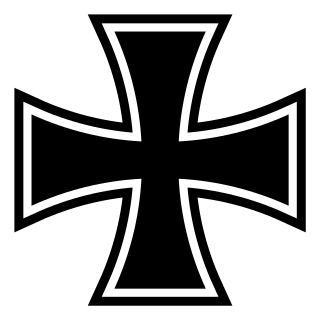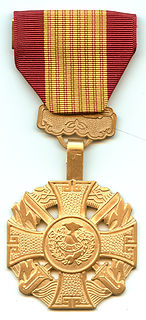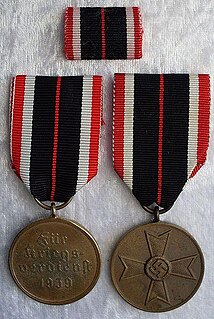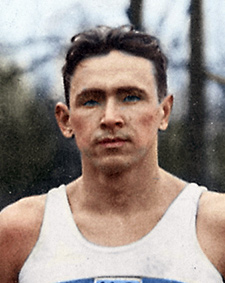
The Iron Cross was a military decoration in the Kingdom of Prussia, and later in the German Empire (1871–1918) and Nazi Germany (1933–1945). King Frederick William III of Prussia established it on 17 March 1813 during the Napoleonic Wars. The award was backdated to the birthday of his late wife, Queen Louise. Louise was the first person to receive this decoration (posthumously). The recommissioned Iron Cross was also awarded during the Franco-Prussian War, World War I, and World War II. The Iron Cross awarded during World War II has a swastika in the center. The Iron Cross was usually a military decoration only, though there were instances awarded to civilians for performing military functions, such as Hanna Reitsch, who received the Iron Cross 2nd Class and Iron Cross 1st Class, and Melitta Schenk Gräfin von Stauffenberg, who received the Iron Cross, 2nd Class, for being civilian test pilots during World War II.

Maria Krystyna Janina Skarbek,, also known as Christine Granville, was a Polish agent of the British Special Operations Executive (SOE) during the Second World War. She became celebrated for her daring exploits in intelligence and irregular-warfare missions in Nazi-occupied Poland and France. Journalist Alistair Horne, who described himself in 2012 as one of the few people still alive who had known Skarbek, called her the "bravest of the brave." Spymaster Vera Atkins of the SOE described Skarbek as "very brave, very attractive, but a loner and a law unto herself."

The Republic of Vietnam Gallantry Cross also known as the Vietnamese Gallantry Cross or Vietnam Cross of Gallantry is a military decoration of the former Government of South Vietnam. The medal was created on August 15, 1950 and was awarded to military personnel, civilians, and Armed Forces units and organizations in recognition of deeds of valor or heroic conduct while in combat with the enemy.
The World War II Victory Medal is a service medal of the United States military which was established by an Act of Congress on 6 July 1945 and promulgated by Section V, War Department Bulletin 12, 1945.

Gunnar Fridtjof Thurmann Sønsteby DSO was a member of the Norwegian resistance movement during the German occupation of Norway in World War II. Known by the nickname "Kjakan" and as "Agent No. 24", he was the most highly decorated citizen in Norway, including being the only person to have been awarded the War Cross with three swords, Norway's highest military decoration.

The War Merit Cross was a state decoration of Nazi Germany during World War II. By the end of the conflict it was issued in four degrees and had an equivalent civil award. A "de-Nazified" version of the War Merit Cross was reissued in 1957 by the Bundeswehr for its veterans.

The Royal Order of the Sword is a Swedish order of chivalry and military decoration created by King Frederick I of Sweden on February 23, 1748, together with the Order of the Seraphim and the Order of the Polar Star.
Bjørn Egge CBE was a Major General of the Norwegian Army and President of the Norwegian Red Cross (1981–1987). He served as deputy head of the NATO Defence College (1976–1980).

The ribbon of Saint George is a Russian military symbol consisting of a black and orange bicolour pattern, with three black and two orange stripes. It appears as a component of many high military decorations awarded by the Russian Empire, the Soviet Union and the current Russian Federation.

The War Merit Medal (Kriegsverdienstmedaille) was a World War II German military decoration awarded to recognize outstanding service by civilians in relation to the war effort. It was instituted on 19 August 1940 and usually awarded to those workers in factories who significantly exceeded work quotas. The War Merit Medal was awarded only to Germans and non-Germans civilians, to men and women. An estimated 4.9 million medals were awarded by the end of the war in Europe. It was closely related to the War Merit Cross, which could be awarded to military personnel and civilians alike for outstanding service to the war effort.

The Military Merit Medal was a military decoration of the Empire of Austria-Hungary. It was founded by Emperor Franz Joseph I on March 12, 1890. The Military Merit Medal is often referred to as the "Signum Laudis" after the inscription on the reverse of the medal.

The Order of Duke Domagoj is the 8th most important medal given by the Republic of Croatia and is the nation's highest award for bravery. The order was founded on April 1, 1995. The medal is awarded for valor in combat. It is named after duke Domagoj of Croatia.

The Polish Army Medal was established by Poland on 3 September 1999 to recognize service to the Polish Army by foreign civilians and military personnel. The medal is presented in three grades Gold, Silver, and Bronze by the Polish Minister of National Defence. Most awards are presented to members of allied armed forces, but the medal is also awarded to civilians who contribute to promoting the history and traditions of the Polish Army outside of Poland.
Polish campaign stars were established on 14 June 2007 to recognize military and civilian participants of overseas missions since 2002. Polish personnel must have been present for at least one day. Foreigners may be presented with a campaign star for collaborating with Polish forces during the mission.
The Pro Patria Medal is a civil state decoration of Poland. Established in 2011, it is awarded by the Head of the Office for War Veterans and Victims of Oppression.
The following is a comprehensive list of orders, decorations, and medals bestowed by the Sovereign Military Order of Malta, both in the present-day and historically.

Artur Stanisław Kołosowski is a brigadier general of Polish Armed Forces, visiting professor at the Military University of Technology in Warsaw. President of the board, and CEO in joint-stock company. Graduate of MBA studies. The author of numerous publications within the scope of national defence and security, and cybersecurity.

Jerzy Iwanow-Szajnowicz was a Polish-Greek athlete who fought as a saboteur in the Greek Resistance during World War II and was executed by the Germans.

Jan Józef Kasprzyk is a Polish historian and politician. Acting Head of the Office for War Veterans and Victims of Oppression, serving since 1 January 2016.

Teresa Klimek (1929-2013) was a Polish educator and activist. Educated to teach mathematics, she taught in various schools in Gorzów Wielkopolski from 1953 to 1984 and was honored for her skill as an educator. She helped found the Gorzów Wielkopolski branch of the Catholic Intellectuals Club as well as the regional branch of Solidarity. Her activism during Poland's struggle for democracy was widely recognized at both the local and national level and she was honored with numerous medals and awards.
















